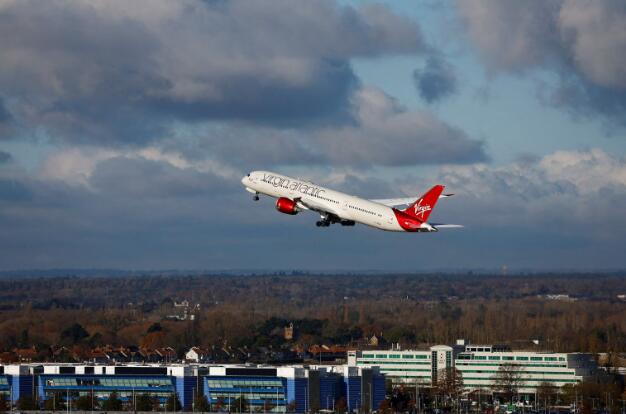The fuel is a blend of waste cooking oils and other fats.
Virgin Atlantic just became the first airline to power a transatlantic flight using 100% sustainable aviation fuel.
The Boeing 787 passenger jet – dubbed Flight 100 – left London’s Heathrow Airport Tuesday morning bound for John F. Kennedy International Airport in New York City, with Virgin Atlantic billionaire founder Richard Branson, Virgin Atlantic Chief Executive Shai Weiss, and U.K. Secretary of State for Transport Mark Harper on board, Reuters reported.
The flight marks the first time a commercial long-haul flight was powered using only sustainable aviation fuel (SAF). It’s scheduled to land at JFK at 2:40 p.m. EST.
The U.K. Civil Aviation Authority granted permission for Virgin Atlantic and its partners, including Rolls-Royce, Boeing and BP, to fly using only SAF following a series of technical reviews last year.
Sustainable aviation fuel is a low-carbon energy source made from non-petroleum feedstocks, according to the U.S. Department of Energy. Intended to reduce emissions from air transportation, sustainable aviation fuel has properties similar to conventional jet fuel, but with a smaller carbon footprint.
“Flight 100 proves that Sustainable Aviation Fuel can be used as a safe, drop-in replacement for fossil-derived jet fuel and it’s the only viable solution for decarbonizing long haul aviation,” Virgin Atlantic’s Weiss said in a statement. “It’s taken radical collaboration to get here and we’re proud to have reached this important milestone, but we need to push further.”
The fuel used for Tuesday’s flight was a blend of mostly processed cooking oil and waste animal fat, according to Virgin Atlantic. The fuel also contained 12% synthetic aromatic kerosene that was made from waste corn.

The low-carbon fuel is expected to keep the airline industry running on lower emissions before electric and hydrogen-powered flights become a reality. It is already being used in jet engines, but is blended with traditional fuel.
Air travel accounted for 2% of global energy-related carbon dioxide emissions in 2022, according to the International Energy Agency.
“The world will always assume something can’t be done, until you do it,” Branson said in a statement about Tuesday’s flight. “The spirit of innovation is getting out there and trying to prove that we can do things better for everyone’s benefit.”
